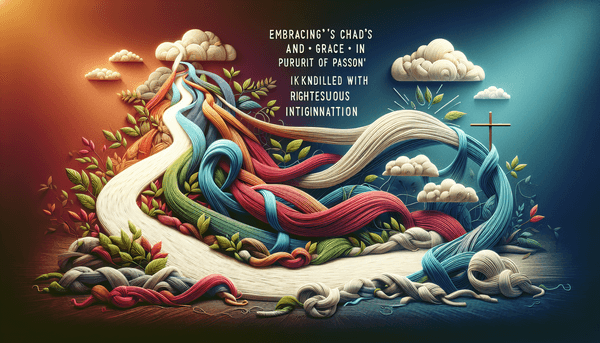Showing Love and Respect in Practical Ways
Love and respect in action speak volumes in relationships. Active listening, an essential component of effective communication, involves truly hearing and empathetically responding to your partner, which is in line with the Biblical exhortation in James 1:19 to be 'quick to listen, slow to speak and slow to become angry.' Demonstrating appreciation by acknowledging and celebrating your partner's value and achievements can be a profound expression of love. The Bible encourages us to bear with one another in love and to look not only to our own interests but also to the interests of others, as stated in Philippians 2:4. Acts of service and spending quality time together are tangible expressions of love and respect that can significantly enhance the bond between partners. As Galatians 5:13 reminds us, we are called to serve one another through love, and as Ecclesiastes 4:9-10 notes, two are better than one, for they can help each other succeed.
The Qualities of a Good Girlfriend/Partner
In the pursuit of being a good girlfriend or partner, the Bible's teachings on love provide a solid foundation. Love, according to 1 Corinthians 13:4-7, is patient, kind, and without envy. It does not boast, it is not proud, and it does not dishonor others. It does not seek its own way, is not easily angered, and keeps no record of wrongs. This scripture can be a guide for treating your significant other with the respect and kindness they deserve. Further, the Bible praises the virtues of wisdom and kindness in Proverbs 31:26, which can be reflected in the way a partner communicates and offers support. The commitment to stand by your partner, as Ruth did, is a testament to the strength of love and loyalty in a relationship. Exploring the fruits of the Holy Spirit and the wisdom found in Proverbs about trusting in the Lord can further enrich this understanding. Song of Solomon 8:7 powerfully states that 'many waters cannot quench love,' underscoring the enduring and unquenchable nature of true love within a partnership.
Conclusion
The Biblical perspective on love serves as a profound guide for establishing and maintaining a relationship rooted in mutual respect and selfless commitment. The principles outlined in the scriptures encourage us to reflect upon our actions and to strive for a partnership characterized by the sacrificial and unconditional love that Christ exemplified. As we integrate these teachings into our daily lives, we not only honor the divine wisdom of the Bible but also enrich our relationships with a depth of love and understanding that can withstand the test of time. Let us remember that in the realm of love, patience, kindness, and perseverance are virtues that pave the way to a fulfilling and harmonious union.
FAQ
Q: What does sacrificial love mean in the context of a relationship?
A: Sacrificial love in a relationship means loving your partner selflessly, prioritizing their needs, and being willing to make personal sacrifices for their well-being, as Christ did for the church.
Q: How can I show love and respect to my significant other in practical ways?
A: You can show love and respect through active listening, showing appreciation, being supportive, performing acts of service, and spending quality time together.
Q: What is love according to the Bible?
A: Love, as described in the Bible, particularly in 1 Corinthians 13:4-7, is patient and kind, does not envy or boast, is not arrogant or rude, and does not insist on its own way. It is not irritable or resentful, does not rejoice at wrongdoing but rejoices with the truth. Love bears all things, believes all things, hopes all things, and endures all things.
Q: How can the Bible guide me in being a good girlfriend or partner?
A: The Bible encourages qualities such as love, respect, kindness, and loyalty in all relationships. Applying principles such as those found in 1 Corinthians 13 can help you be a supportive and loving partner.






